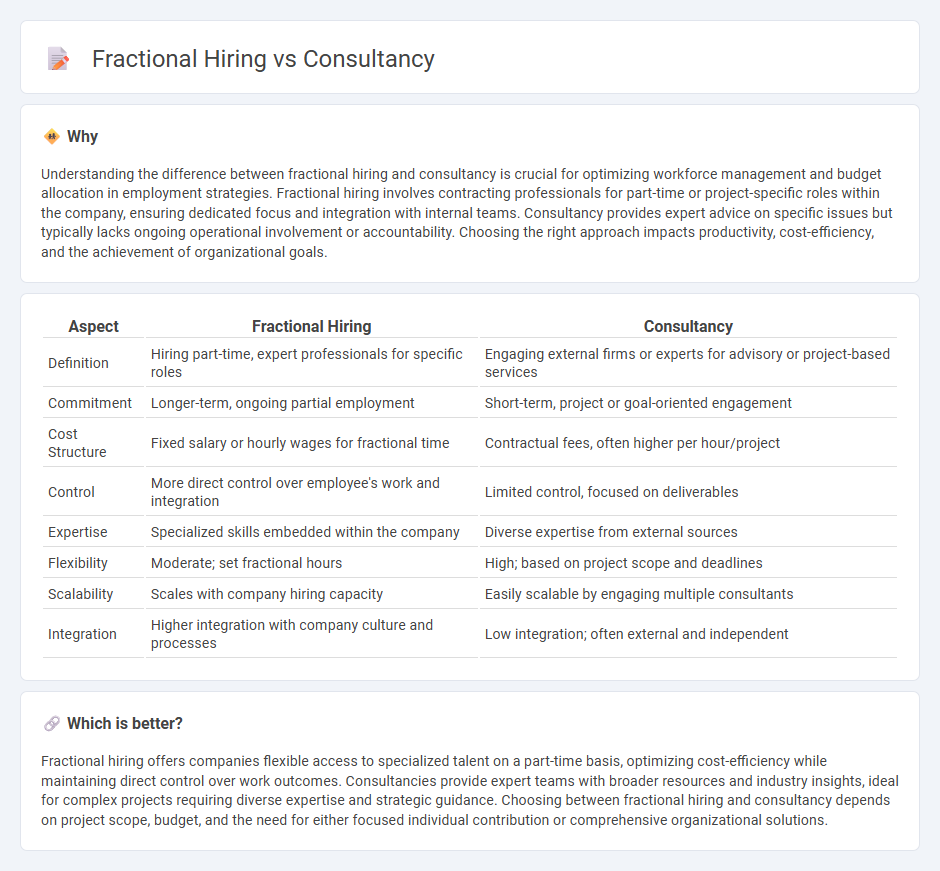
Fractional hiring allows businesses to engage skilled professionals on a part-time or project-specific basis, optimizing workforce flexibility and reducing overhead costs compared to traditional full-time roles. Consultancy services provide expert advice and strategic planning without direct involvement in daily operations, making them ideal for targeted problem-solving and short-term initiatives. Explore the differences between fractional hiring and consultancy to determine the best approach for your organization's employment needs.
Why it is important
Understanding the difference between fractional hiring and consultancy is crucial for optimizing workforce management and budget allocation in employment strategies. Fractional hiring involves contracting professionals for part-time or project-specific roles within the company, ensuring dedicated focus and integration with internal teams. Consultancy provides expert advice on specific issues but typically lacks ongoing operational involvement or accountability. Choosing the right approach impacts productivity, cost-efficiency, and the achievement of organizational goals.
Comparison Table
| Aspect | Fractional Hiring | Consultancy |
|---|---|---|
| Definition | Hiring part-time, expert professionals for specific roles | Engaging external firms or experts for advisory or project-based services |
| Commitment | Longer-term, ongoing partial employment | Short-term, project or goal-oriented engagement |
| Cost Structure | Fixed salary or hourly wages for fractional time | Contractual fees, often higher per hour/project |
| Control | More direct control over employee's work and integration | Limited control, focused on deliverables |
| Expertise | Specialized skills embedded within the company | Diverse expertise from external sources |
| Flexibility | Moderate; set fractional hours | High; based on project scope and deadlines |
| Scalability | Scales with company hiring capacity | Easily scalable by engaging multiple consultants |
| Integration | Higher integration with company culture and processes | Low integration; often external and independent |
Which is better?
Fractional hiring offers companies flexible access to specialized talent on a part-time basis, optimizing cost-efficiency while maintaining direct control over work outcomes. Consultancies provide expert teams with broader resources and industry insights, ideal for complex projects requiring diverse expertise and strategic guidance. Choosing between fractional hiring and consultancy depends on project scope, budget, and the need for either focused individual contribution or comprehensive organizational solutions.
Connection
Fractional hiring and consultancy are interconnected as both provide specialized skills and expertise to organizations without long-term commitments, allowing businesses to access high-level talent on a part-time basis. Fractional hiring offers companies the flexibility to fill specific roles for limited durations, while consultancy delivers strategic guidance and problem-solving through expert advisors. This approach leads to cost-effective workforce solutions, enhancing operational efficiency and agility in dynamic market conditions.
Key Terms
Expertise
Consultancy provides specialized expertise through external advisors who address specific business challenges with tailored strategies. Fractional hiring offers partial-time, in-house access to seasoned professionals who integrate deeply into a company's operations for ongoing support. Explore the advantages of each approach to determine which best aligns with your organization's expertise needs.
Commitment level
Consultancy engagements typically involve short-term, project-based commitments where consultants provide specialized expertise without long-term obligations, allowing businesses flexibility. Fractional hiring offers a higher commitment level, with professionals dedicating a portion of their time regularly to a company, ensuring continuity and deeper integration into the team. Explore further to understand how commitment differences impact your business strategy.
Payment structure
Consultancy payment structures typically involve fixed fees or hourly rates based on project scope, while fractional hiring generally offers a retainer or monthly salary proportional to part-time executive involvement. Consultancies bill for predefined deliverables, whereas fractional hires provide ongoing strategic support, often resulting in more predictable budgeting. Explore detailed comparisons to determine which payment model aligns best with your business goals.
Source and External Links
What is consulting? - Consultancy is the provision of independent, specialist advice and/or implementation support to organisations across various industries, focusing on business strategy, management, operational processes, and technology.
What is consulting? - Consulting involves providing expert, unbiased advice or implementation services to help clients solve problems, often in business advisory, leveraging a knowledge advantage and an independent perspective.
15 Types of Consulting (And How To Choose Your Specialty) - Consulting includes many specialties such as strategy, financial, healthcare, and technology consulting, and consultants can be either generalists working across industries or specialists focused on particular sectors or problems.
 dowidth.com
dowidth.com